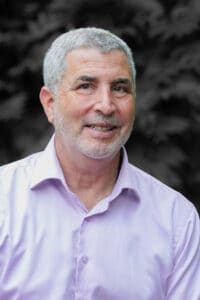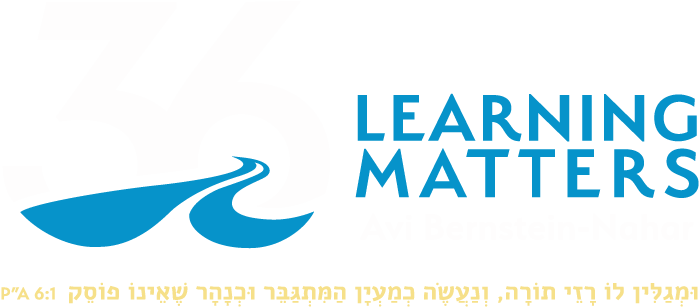About Avi Bernstein-Nahar and 36 LEARNING MATTERS
 I cannot remember a time when I wasn’t in search of the best conversations I could find, and from childhood, I was also intensely curious about my roots: what did my ancestors’ geographic location, ethnicity, politics, religious practices, and literary preferences have to do with me?
I cannot remember a time when I wasn’t in search of the best conversations I could find, and from childhood, I was also intensely curious about my roots: what did my ancestors’ geographic location, ethnicity, politics, religious practices, and literary preferences have to do with me?
As I grew it became a quest—first at Brown University, where I poured myself into courses in ethics, religion, and political philosophy and put myself on the rack with analytic philosophers Ernest Sosa and Roderick Chisholm. Professor Ed Beiser pointed me to Pardes Institute in Jerusalem, where I entered the garden of Torah study, from which, as the story goes, some emerge enlightened, but many suffer a less desirable fate.
With a Stanford PhD in religious studies in hand, a not-yet-satisfying orientation to Jewish tradition, but at least a decent orientation to Hegel’s quarrel with Kant, and an appreciation for the phenomenologists’ quarrel with both, I joined Hebrew College’s adult Jewish education program, and began offering seminars in Jewish studies three hours at a time to some of the smartest and most ambitious adult learners the baby-boomer generation had to offer. This was humbling, as I had many holes in my Jewish and general education to fill in, but Hebrew College President David Gordis allocated me the time to address this, and I had the hunger to do so. When my time at Hebrew College came to a close, I took a few years to study learning design with some exemplary high school English teachers in the Newton Public School system, then moved on to a leadership position at the Osher Lifelong Learning Institute at Brandeis University, where, even after departing the Institute, I continue to affiliate as a visiting scholar in the Department of Near Eastern and Judaic Studies.
Which brings me to the present moment: today’s crises—which none of us welcome, but where, on some level, we all find ourselves today—have thrust us into each other’s arms and, for the likes of us reading this webpage, into searching conversation. In such times we revisit our origins, whether conceived as the lands we think of as our birthplaces, our families of origin, our first defining communities, or our most foundational stories.
To provide learning that matters for this moment, I am focused on these programmatic questions:
- What Jewish study will bring you inside the Jewish lifeworld and help you find your place within it? I begin with texts, especially the Hebrew Bible. With a special emphasis on giving all-comers an opportunity to confront the primordial Hebrew text, we study those English translations, i.e. by Everett Fox and/or Robert Alter, that recognize that not only content but also form is essential to recovering a living Torah for our generation. With these translations in hand, we don’t need to know Hebrew to orient ourselves to what’s special in the sounds, rhythms, syntax, and lexicon of Torah.
- How have outstanding Jewish thinkers understood the crises of their time and what can we learn from their insights about our current challenges? We begin by listening for the voices of some extraordinary forebears about how they navigated their crisis-ridden Jewish world: Martin Buber (Vienna, 1878-1965), Walter Benjamin (Berlin, 1892-1940), Hannah Arendt (Hanover, 1906-1975), and Gershom Scholem (Berlin, 1897-1982), and most especially, Hermann Cohen (Coswig,1842 -1918), and Franz Rosenzweig (Kassel, 1886 – 1929). These rebels ultimately tried to overthrow their parents’ Jewish world and replace it with something radically different in response to the fin-de-siecle cataclysms well-known to us today: genocidal anti-semitism, population explosion, urbanization and oppressive social conformity, Jewish assimilation and self-loathing, and Christian supercessionism. What will be our reply to the crises of our current moment?
- What is Zionism and what are the historical sources of today’s profound conflicts inside the contemporary Zionist movement? Let’s uncover Zionism at its roots, and confront what earlier people called—without prejudice—the “Jewish question,” alluding to the difficulty of being a Jew in Christendom, a fact that led most 19th century European Jews to contemplate some kind of exit, whether by way of assimilation, emigration, revolution, or the founding of a new state. Regardless of your disposition to the state of Israel, I value your participation in this essential inquiry.
- How do Jewish educators move beyond the logic of “what will sell?” to decide what to offer and how to deliver it? We will help you and your colleagues identify the teachers and the Torah that best express your communities’ vision and direction, and assist you in ensuring that their teaching is consequential across the organization. Learn more.
- What can the Jewish community provide its clergy, scholar-teachers, young people and other seekers to catalyze their quest for self-understanding and Jewish commitment? We offer intensive learning concentrated in a week’s time, or extensive learning, spread out across the entire year. I have written about the need for a Tikkun Olam social-justice-oriented Judaism — a paradigm that dominates the non-orthodox scene in much of today’s Jewish world — to seek and to find real roots in the Jewish tradition, lest it appear and, in fact, turn out to be, just a form of politics masquerading as Judaism. The roots are there to be found. Our ancestors have provided the sources we need. To understand them and make them our own will require a substantial investment in learning and a seriousness of purpose. Our ancestors have suffered crises of great proportion before, and mustered the resolve to renew themselves through learning. Do we have a similar resolve today?
Intensive Learning Academies for the Academic Community: Where can academically trained scholar-teachers, including clergy, find opportunities to deepen their learning, build their educational vision, recharge their batteries, and sharpen their sense of purpose? Our academies feature brief intensives, conveniently scheduled during one week’s time, designed for individuals who wish to take command of new frontiers of scholarship and make this learning relevant to the vital interests of their students and communities. Here I will draw on my scholarship in philosophy and religious thought and the expertise of my close colleagues: I am proud to say that I bring special expertise in the history and legacy of Marburg neoKantianism, and my scholarship, the fruits of my 1998 Stanford dissertation, are available online and continue to be cited as standard bibliography for “Hermann Cohen,” Stanford Encyclopedia of Philosophy, 2024.
Extensive Learning for the Next Generation of Radical Jews: Where can young people dive deeply into, and debate the nature of the radical life they’d like to practice as Jews living in a time of crisis? Where can they seek out and find Jewish moral and political foundations as the basis for a critical, committed approach to a Jewish way of life? By the end of the year-long-academy, students will be able to articulate the nature and basis for their own approach out of classical Jewish sources and modern and contemporary critical theory. They will be able to offer an account of how and to what extent a Jewish lifeworld and trans-generational tradition is normative for them and they will know their way around Jewish history and texts well enough to do so.
Avi Bernstein-Nahar received his doctorate in religious studies from Stanford University and a BA in philosophy from Brown. His dissertation, Accounting for Modern Jewish Identity: Hermann Cohen and the Ethics of Self-Responsibility, presented Herman Cohen’s Marburg Neo-Kantianism as an initiative to provide transcendental foundations for Jewish identities in Wilhelmine Germany, and to use the resulting theory to critique existing attitudes about, inter alia, die jüdische Gemeinde/government sponsored religious community, Eastern European Jewry, and sacred texts. In a concluding chapter, Bernstein-Nahar argued that contemporary philosopher Charles Taylor, while not aspiring, like Cohen, to an entire system of philosophy, made similar moves in offering transcendental foundations for identities, and in utilizing the resulting picture of “human parts,” i.e. narratives, goods, virtues, practices, imagined communities, in order to function as a social critic.
Updated portions of his dissertation appeared in the edited volume, Hermann Cohen’s Ethics (Gibbs 2006) as “In the Name of a Narrative Education: Hermann Cohen and Historicism Revisited.” Here he expanded the dissertation’s picture of Cohen as a critical theorist trying to dodge the Scylla of “crisis-ridden” historicism and the Charybdis of a benighted rationalism. As Scott Edgar notes in his 2024 Herman Cohen entry in the Stanford Encyclopedia of Philosophy, Bernstein-Nahar finds in Cohen’s ethical monotheism a transcendental basis for Jewish identity-pluralism, including, it should be remarked, Faith Keepers (rabbinic Jews), Renaissance Seekers (cultural Jews), and Ethically-Driven Returnees (liberal and radical Jews).
In January of 2020, Bernstein-Nahar had the privilege of interviewing Frederick C. Beiser on the occasion of the publication of his intellectual biography of Hermann Cohen. You can listen to the interview here.
He has been lauded as a “gifted and passionate teacher,” and praised for bringing “deep learning and empathy” into the classroom. He has taught at Rutgers, Boston College, and at Brandeis University. From 2012 to 2023, he served as Executive Director of Brandeis’ Osher Lifelong Learning Institute, and, earlier in his career, as Dean and Director for Adult Learning programs at Hebrew College. Currently Bernstein-Nahar is a Visiting Scholar in Brandeis University’s Department of Near Eastern and Judaic Studies, a Tamid faculty member at Hebrew College, Newton, Mass., and founder of 36learningmatters.com, an adult Jewish learning practice, based in Newton, Mass..
America’s Promise: Emmanuel Levinas between Marburg and Manhattan, Religious Studies Review, Vol. 34, No. 3, 145 – 152, 2008.
In the Name of a Narrative Education: Hermann Cohen and Historicism Revisited, in Hermann Cohen’s Ethics, edited by Robert Gibbs, Brill, 2006.
The New Learning in Adult Jewish Education, Journal of Jewish Education, 1999-01, Vol.65, No. 3, 33-40,1999-2001.
Hermann Cohen’s Teaching Concerning Modern Jewish Identity, Yearbook – Leo Baeck Institute, 1998-01, Vol.43, No. 1, 25-46.
